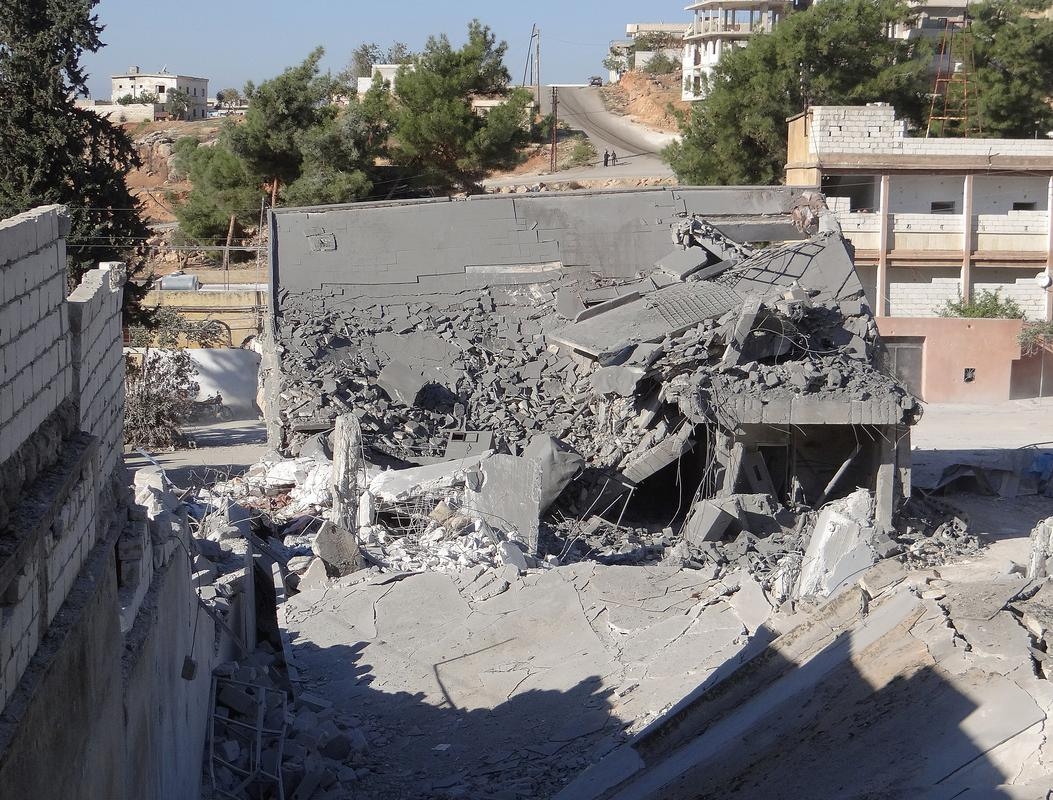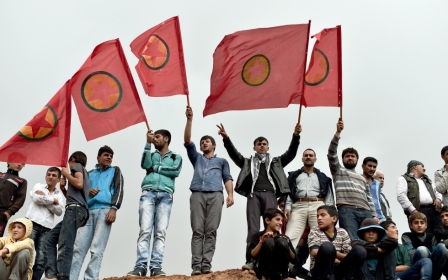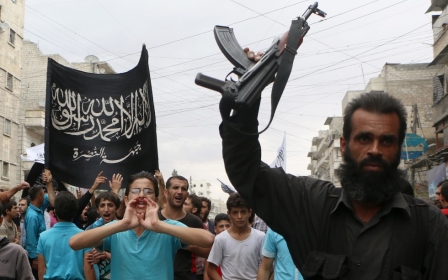Abu Maria: The Nusra leader behind the split with IS in Syria?

AMMAN - An ideological split in Syria’s militant Jabhat al-Nusra group is threatening to leave thousands of pro-Islamic State fighters leaderless and rudderless in one of the country’s last IS-free strongholds.
Current and former members of Jabhat al-Nusra say the organisation is split over how it regards IS. While some Nusra members see IS as a respected militant group with an alternative approach, others regard IS militants as a pack of morally bereft terrorists.
Earlier this week reports emerged that after months of fighting between the groups, a deal had been agreed to have Nusra - al-Qaeda’s official representative in Syria - and IS – a controversial offshoot of al-Qaeda – join forces. If this proves true, the ramifications could be significant and end months of open divisions.
While the two sides originally seemed to be fighting together in Syria, by February of this year tensions had grown so severe that al-Qaeda leader Ayman al-Zawahiri disavowed IS, saying that al-Qaeda was “not responsible” for IS's actions and had no “connection with the group”.
In early July, heavy fighting between IS and Jabhat al-Nusra in the eastern Syrian city of Deir ez-Zour drove the region’s Nusra chapter out. The militants had no option left but to join other Nusra groups in southern Syria.
Abu Maria Al-Qahtani, the commander of Nusra in Deir ez-Zour, arrived in Daraa in southern Syria accompanied by hundreds of fighters with their families, about 700 people in total. Most stayed in Daraa and joined the Nusra groups there. But one group of fighters, headed by Sultan Atwi, and nicknamed “Abu Laith Altbuque,” preferred to stay alone.
According to locals, Abu Maria was a vocal critic of IS, especially after the battles in Deir ez-Zour. Upon his arrival in Daraa, Abu Maria took a leadership role in Nusra and met with remaining battalions and brigades as well as other rebel military groups in Daraa. According to Mohammed Ktefa, a media activist who was close to Nusra, Abu Maria spoke almost exclusively about IS and its activity in Deir ez-Zour.
When anyone shared their opinion or was not actively cursing IS, Ktehan said, Abu Maria would accuse them of being Da’esh [the Arabic abbreviation for IS], even if that person was in no way a supporter of the group.
According to sources in Nusra, this provoked a lot of Nusra fighters in Daraa because the only subject of conversation in was IS or “Da’esh.” Fighters claimed that all meetings, lessons, speeches and conversations with Abu Maria were about "Da’esh” – something that quickly began to drive an ideological wedge into Nusra.
The issue came to a head in mid-October, when in one meeting, an angry Nusra fighter took a stand.
“Abu Maria,” he said. “If you want to fight the Islamic State then go back to Deir ez-Zour! Why are you here in Daraa?"
Abu Maria allegedly said it was too difficult to go back to Deir ez-Zour, and that as the Syrian government was supporting IS. By fighting the government, he was taking on the militant group.
But the damage had already been done.
Over the next two weeks, Nusra fighters began to leave the Daraa region, heading towards Qalamoun, and Ghouta near Damascus. According to Ktefan, who left Nusra to operate as an independent, even those who left Nusra in Daraa to join Nusra groups elsewhere were accused by Abu Maria as being IS – a suspicion that may have some merit with reports surfacing that Nusra fighters were allegedly making their way north to join IS fighters battling Syrian Kurdish forces.
Until now, Nusra has managed to keep this internal dispute secret and away from the media, a police that falls in-line with the group’s firm policy on discretion around internal matters.
But that began to change when, in recent weeks when a senior Nusra figure Sultan Atwi - also known as Abu Laith Altbuque - spoke up publicly. The dual Syrian-Saudi national accused Abu Maria of having led a weakened battle against the Syrian government: “Nusra won huge money from oil wells and gas stations, but the surprise was that during the battle with the state, we did not find quality weapons. Even rifles were scarce,” Atwi said.
Atwi alleged that there had been a carefully orchestrated refusal to open a legitimate debate about what happened to drive Nusra from Deir ez-Zour.
“There was a big campaign since the arrival of Abu Maria in Daraa; it was clear by their speech and promotion that the problem with the state was ‘cracking heads,’ refusing to be defeated,” he said.
He expressed his dissatisfaction with Nusra leadership, all the way to the top of the organisation: "The east fell to the Islamic State and completely collapsed and there was massive military, financial and administrative corruption, but [Nusra leader] Abu Mohammed Joulani did not ask for any investigation, and ordered us to pull out to Daraa.”
“At this time, I decided to announce my separation from Nusra, but the brothers advised me not to declare, for fear of sedition. I got letters from some of the elders, exhorting me to keep silent,” Atwi said.
But the silence had been broken, and the cost of Nusra’s re-alignment in Daraa - fully led by Abu Maria - was clear. Although the group was making military gains through Abu Maria’s convergence policy; they were fighting alongside more so-called moderate factions in several key battles, including the fight at Tal al-Hara which wrestled the region’s tallest point out of government control. But there has been an ideological cost of driving fighters like Sultan Atwi away.
There is little doubt that in past months, Nusra in Daraa has changed significantly. Abu Maria met with all factions and armed battalions in Daraa - even the battalions that had previously been at odds with Nusra. And when some more so-called moderate battalions requested that Nusra change some of its leaders, it heeded those requests - a policy shift that few expected.
While this could have won favour with other opposition groups, sources within Nusra privately admit that Abu Maria’s policy is a failed one in the long term: they say it failed them in Deir ez-Zour and they see that happening again in Daraa now.
According to Atwi, these ideological fault lines existed in Deir Az-Zor during Nusra’s battles against the state. “Subtle fingers were pushed in order to sustain the fight in the East when it could have been stopped. Calls were made to sustain the fight, and time will justify these calls,” he said.
It is clear that Atwi's remarks widened the rift within Nusra, not only in Daraa but in Syria in general.
In the northern province of Idlib, the split within Nusra has become even deeper, to the point that Nusra fighters there have launched a heavy offensive on the Syria Revolutionaries Front (the moderate opposition). They made major strides when they claimed the home of SRF leader Jamal Marouf, who publicly denounced Nusra. The repercussions of this northern crisis have yet to play out in the south, where some Nusra factions - namely those led by Abu Maria - still fight alongside moderate opposition groups.
There is also the IS factor. Sources in Nusra say that Abu Maria’s criticism of the group conversely led them to feel more sympathetic towards it. Atwi’s outburst also suggests that there is a personal factor, and that some of Nusra’s membership feels it has been lied to by Abu Maria. These feelings are still raw, and they likely extend beyond Atwi and the men he leads.
Although IS has not yet shown an official presence in southern Syria, the escape of a large number of Nusra fighters from Daraa may change this. Insiders say that it is likely that a number of Nusra’s southern defectors will go on to join IS in northern and eastern Syria. Other defectors - along with IS sympathiser, Mohammad Ktefan – however say they will stay in Daraa.
The layout of Syria’s armed opposition changes almost daily, but the rift happening in Nusra is important because the organisation is known for its effective, well-organised militant fighters. Changes in Jabhat al-Nusra affect the entire battlefield. These current changes indicate, without a doubt, the beginning of a new phase of the conflict in Syria.
New MEE newsletter: Jerusalem Dispatch
Sign up to get the latest insights and analysis on Israel-Palestine, alongside Turkey Unpacked and other MEE newsletters
Middle East Eye delivers independent and unrivalled coverage and analysis of the Middle East, North Africa and beyond. To learn more about republishing this content and the associated fees, please fill out this form. More about MEE can be found here.




